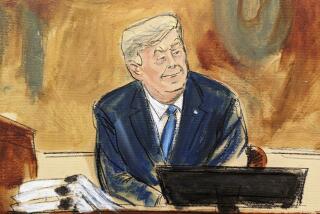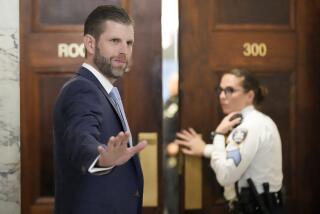Jared Kushner may face new scrutiny over tangled financial holdings
President Trump’s son-in-law and senior advisor Jared Kushner has enjoyed the gilded highs of White House life — attending Trump’s first official state dinner last month, conducting secret diplomacy in the Middle East and counseling the president on fast-paced foreign trips.
Kushner also has endured the lows — he’s been pulled into the special counsel investigation into Russian meddling in the 2016 campaign for his still-murky private meetings with Russians, including a Kremlin-connected lawyer from Moscow who spoke almost no English.
He has been mocked on late-night TV, portrayed with a squeaky voice by Jimmy Fallon, and publicly derided by Trump’s lawyer, Rudolph W. Giuliani, as “disposable.”
If Democrats win the House or Senate this fall, as some polls suggest, Kushner almost certainly will face a more direct danger — congressional investigations into potential conflicts of interest with his family’s vast financial holdings, and growing questions about his failure to qualify for a high-level security clearance.
“We have to be worried about how our national security may be weakened when Jared Kushner has all these conflicts of interest and at the same time has great power through the White House,” Rep. Raja Krishnamoorthi (D-Ill.), who sits on the House Government Reform and Oversight Committee, said in an interview.
“How is it possible that someone who has such suspicious entanglements with foreign governments and foreign actors can even enter the White House, much less occupy a high office?” asked Rep. Jamie Raskin (D-Md.), another member of the committee.
Peter Mirijanian, a spokesman for Abbe Lowell, one of Kushner’s lawyers, said Kushner has followed his legal team’s ethics advice in the White House and signed a written ethics agreement “that was reviewed by outside lawyers and White House counsel” to avoid any conflicts of interest.
“He has lived up to every sentence in it,” Mirijanian said.
There’s no way for the public to know, however. Cabinet secretaries and other executive branch officials file ethics agreements with the Office of Government Ethics, which makes the documents public. As a White House staffer, Kushner filed his with the Executive Office of the President.
That office is not legally required to release it, and in this case it has not. Kushner’s lawyer also declined to either provide a copy or characterize its contents for this article. The lack of transparency troubles ethics specialists.
“I don’t know why you would not make available to the public an ethics agreement for a public official who is in such a powerful and influential role,” said Don Fox, who served as general counsel at the Office of Government Ethics under Presidents George W. Bush and Barack Obama.
Fox called Kushner’s publicly known financial holdings “amazingly complex.” Kushner is married to Trump’s eldest daughter, Ivanka, who is also on the White House staff as a senior advisor and has her own significant business interests.
In the decade before he joined the White House, Kushner headed his family’s privately held Kushner Companies LLC. He has divested some holdings, including a position in Kushner Cos. to a trust controlled by his mother, Seryl Kushner. But he has kept the bulk of his ownership intact.
In public financial disclosure filings last year, Kushner valued his real estate and other holdings in the range of $206 million to $760 million. But the forms provide an incomplete picture.
Kushner holds investments in numerous limited liability companies for commercial real estate ventures, for example. The forms do not require him to identify his lenders or equity partners.
“What we don’t have visibility into is all of the companies and individuals that Kushner is connected to financially,’’ said Kathleen Clark, a professor of ethics law at Washington University in St. Louis.
Kushner Cos. owns mixed-use commercial buildings and thousands of residential apartment units, primarily in New Jersey, New York and Maryland.
Kushner, now 37, took over the company after his father, Charles, pleaded guilty in 2004 to federal charges of tax evasion and witness tampering. He served a two-year sentence in a prison in Montgomery, Ala., and a halfway house in Newark, N.J., and paid a civil penalty of $508,900 to the Federal Election Commission for making improper campaign contributions.
Jared Kushner had studied law at New York University and was an intern in the Manhattan district attorney’s office when his father was arrested. The case left him wary of federal prosecutors armed with subpoenas and cooperating witnesses.
“My dad’s arrest made me realize I didn’t want to be a prosecutor anymore,’’ Kushner told the Real Deal, a real estate trade magazine, a decade later. “If you’re convicting murderers, it’s one thing. It’s often fairly clear. When you get into things like white-collar crime, there are often a lot of nuances. Seeing my father’s situation, I felt what happened was obviously unjust in terms of the way they pursued him.”
In 2007, as chief executive of Kushner Cos., he oversaw the purchase of a 41-floor office tower at 666 Fifth Ave. in Manhattan for $1.8 billion. It was the most ever paid for a New York building.
When the housing market crashed in 2008, triggering a deep recession, prices plummeted for top-of-market properties. Kushner’s plans to lavishly upgrade 666, as the building is known, were canceled and commercial leasing suffered.
In response, Kushner Cos. leveraged the building further. Those notes, totaling about $1.4 billion, are due next February. Jared Kushner sold his stake in 666 to a family-controlled trust when he joined the White House.
Similar debt-related pressure surrounds a 30-story office tower in the heart of Chicago’s West Loop. Kushner Cos. bought the iconic tower for $275 million in December 2007, also on the eve of the recession.
Sen. Elizabeth Warren (D-Mass.) has questioned how Kushner Cos. obtained $184 million in mortgage refinancing for the building last November. A New York-based firm, Apollo Commercial Real Estate Finance Inc., made the loan. One of its major shareholders is the government of Qatar.
Joshua Harris, co-founder of the parent company, Apollo Global Management LLC, met several times with Kushner at the White House in early 2017. Those discussions focused on “general U.S. economic policy,” said Mirijanian, the spokesman for Kushner’s lawyer.
Charles V. Zehren, a spokesman for Apollo Global Management, would not say if Qatar is involved with the loan to Kushner Cos. Apollo is reviewing the matter, Zehren said. A spokesman for Qatar’s ambassador in Washington declined to comment.
The extensive debts have fueled concerns about Kushner’s potential financial conflicts at the White House — and have intersected with special counsel Robert S. Mueller III’s investigation into whether Kushner or anyone else in Trump’s campaign assisted Russian meddling in the 2016 election.
On Dec. 13, 2016, a month after Trump was elected, when Kushner still was at the helm of Kushner Cos., he met privately in New York City with Sergei N. Gorkov, chairman of Russia’s Vnesheconombank. The state-run bank was under U.S. and European Union economic sanctions at the time, a result of Russia’s seizure of Crimea in 2014.
White House officials later said Kushner was seeking to improve U.S. relations with Moscow, as Trump has frequently urged. The Russian bank suggested another motive, saying Gorkov met with “the head of Kushner Companies, Jared Kushner,” as part of “Vnesheconombank’s development strategy until 2021.”
Kushner told the Senate and House Intelligence committees last July that Sergey Kislyak, then Russia’s ambassador in Washington, had suggested the meeting because Gorkov “had a direct relationship’’ with Russian President Vladimir Putin.
Kushner said they met for about 25 minutes and after discussing U.S.-Russian relations, Gorkov “told me a little about his bank.” He added, “At no time was there any discussion about my companies, business transactions, real estate projects, loans, banking arrangements or any private business of any kind.”
Criticism also followed the Kushner Cos.’ attempt to sell a $400-million stake in 666 to a Chinese entity, Anbang Insurance Group. Bloomberg reported the then-pending sale in March 2017, while Kushner was helping Trump prepare for an upcoming summit with Chinese President Xi Jinping in Florida.
Critics questioned if Kushner was unlawfully exploiting his government position for his own benefit or that of his family.
“This deal, if executed, would appear to present a clear conflict of interest for Jared Kushner,” five Senate Democrats wrote to the White House at the time. Five days later, Kushner Cos. and Anbang announced the deal was off.
Another controversy erupted over Kushner’s repeated trips to the Middle East as a special envoy for Trump, and Kushner Cos.’ efforts to win financing from the Persian Gulf state of Qatar for the distressed 666 property.
In April 2017, Kushner’s father met in New York with Qatar’s minister of finance, Ali Sharif Al Emadi, who oversees an investment authority with more than $330 billion in managed assets. The Intercept, an online investigative website, later reported that Charles Kushner “made a direct pitch” for Qatar to invest in the building, although no deal ultimately was struck.
Charles Kushner and Kushner Cos. referred inquiries to a spokeswoman, Chris Taylor. She declined to answer written questions submitted for this article.
U.S. relations with Qatar, home to the largest American air base in the Middle East, have deteriorated. Last summer, after Trump and Kushner visited the region together, the president sided with Saudi Arabia and other Arab allies who imposed a land and sea blockade against Qatar for allegedly sponsoring terrorism.
The blockade has fueled suspicions, but no hard proof, that Kushner’s advice to Trump may be influenced by his family’s business problems.
“Some Qataris see this Kushner involvement as a shakedown that they ended up on the wrong side of,” said David B. Roberts, a Persian Gulf scholar at King’s College London. “If Qatar had invested [in 666], is there any real chance that Kushner would have supported the blockade?”
The meeting that has drawn the most intense scrutiny didn’t focus on money, however.
On June 9, 2016, Kushner and two other top strategists from Trump’s presidential campaign — his eldest son Donald Trump Jr. and his campaign manager Paul Manafort — met on the 25th floor of Trump Tower in Manhattan with a former Moscow prosecutor named Natalia Veselnitskaya.
It was unusual in several ways, not least because Veselnitskaya spoke almost no English and addressed the group in Russian, relying on her translator.
Trump Jr. had arranged the meeting after an intermediary for a Russian oligarch had said in an email that Veselnitskaya could provide “official documents and information that would incriminate Hillary” Clinton, the Democratic nominee. The offer, the email said, “is part of Russia and its government’s support for Mr. Trump.”
Trump Jr. said later that no incriminating information was provided. Kushner has said he didn’t notice the offer about Clinton in the email chain. He said he left the meeting after 10 minutes or so and soon forgot about it.
The special counsel’s office interviewed Kushner late last year. Kushner has publicly denied any wrongdoing.
“I did not collude with Russia, nor do I know of anyone else in the campaign who did so,” he told reporters on July 24. “I had no improper contacts. I have not relied on Russian funds for my business.”
After Trump won the White House, he named Kushner his administration’s point man to seek peace between Israel and the Palestinians, and on other sensitive matters in the Middle East.
Kushner was granted interim access to highly classified information, including the President’s Daily Brief, the top-secret gleanings from America’s intelligence-gathering systems worldwide.
In early 2017, Kushner submitted his application for a government security clearance, a process that requires disclosure of past close contacts with foreigners. He did not cite his meeting with Veselnitskaya, his discussions with Russia’s ambassador in Washington, his meeting with Gorkov, or any other foreign contacts.
Kushner later blamed his aides for submitting his incomplete “Standard Form 86” security application. He subsequently amended it four times, listing more than 100 names, according to people familiar with the document, which has not been made public.
John F. Kelly, the White House chief of staff, notified Kushner and other staffers in February that they would lose routine access to highly classified information if their applications remained unapproved. Trump has authority to share classified materials with anyone he chooses, so it’s not known if Kushner has lost any access.
National security experts say Kushner’s financial ties, the Kushner Cos.’ huge debts and his failure to report foreign contacts should raise red flags. Some question how he operates in the White House, or advises the president, without a high-level security clearance.
“If Kushner were not the president’s son-in-law, he would be nearly impossible to clear,” said Mieke Eoyang, a former senior staff lawyer on the House Intelligence Committee and the House Armed Services Committee.
At a congressional subcommittee hearing on Oct. 11, Rep. Krishnamoorthi cited Kushner when he asked an executive branch official if he could recall any other security application that was supplemented with “four addenda detailing over 100 errors and omissions?”
The official, Charles S. Phalen Jr., director of national background investigations for the Office of Personnel Management, replied: “I have never seen that level of mistakes.”
More to Read
Get the L.A. Times Politics newsletter
Deeply reported insights into legislation, politics and policy from Sacramento, Washington and beyond. In your inbox three times per week.
You may occasionally receive promotional content from the Los Angeles Times.







